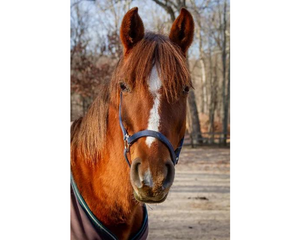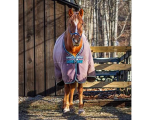Where is Odessa located?
Close X
Odessa is located at Rising Starr Horse Rescue, 93 Silver Spring Rd, Wilton, CT 06897.
Total acreage dedicated specifically to the horses: 39
Our organization has use of the following at this facility:
Structures/Barns: 1 Run-in sheds: 3
Pastures: 10 Paddocks/Pens/Turnout Areas: 6
Uncovered Outdoor Rings: 1 Indoor Rings: 1
Horses have assigned stalls in the structure(s).
Horses are stalled for 9-12 hours per day, on average.
The following describes the pastures at this facility:
This facility has a written plan in place for pasture management, which includes guidelines for seeding, fertilizing, irrigation, mowing, dragging, harrowing, manure removal, removal of debris, the control of poisonous plants, and a schedule for cleaning
A dedicated staff person(s) is responsible for pasture management
All pastures are fenced to prevent escape or injury
Fencing checks, such as broken or missing planks, loose fence posts, exposed or loose nails, detached wires, etc., are done regularly
Pastures are rotated
Pastures have natural protection for equines (i.e., trees)
Pastures have man-made protection for equines (i.e., shelters)
The following describes the turnout areas other than pastures at this facility:
This facility has a written plan in place for the maintenance of turnout areas, which includes a schedule for cleaning, manure removal, and dragging
A dedicated staff person(s) is responsible for the maintenance of turnout areas
All turnout areas are fenced to prevent escape or injury
Turnout areas have man-made protection for equines (i.e., shelters)
Fencing checks, such as broken or missing planks, loose fence posts, exposed or loose nails, detached wires, etc., are done regularly
How many hours per day, on average, are horses turned out:
Equines are out 4 to 8 hours per day
Equines are out 9 to 15 hours per day
Equines are out 24/7
Equines are out 24/7 except they are brought in to feed
Equines are out 24/7 except they are brought in if there is inclement weather
Equines are out 24/7 except when they are being trained
Equines are out 24/7 except when they are used for the conduct of the organization's programs
The following items are consistent with our feed management plan and practices:
Equines are provided with individualized feeding plans, including supplements, according to age and any health issues
Feed plans are determined in consultation with a veterinarian
Supplement plans are determined in consultation with a veterinarian
Equines are fed in individual stalls
Staff and volunteers are trained in proper feed measurements and protocols and observed periodically to ensure they are feeding correctly
The feed chart is centrally located and updated as needed
The area(s) where hay, feed, grain, and supplements are stored are kept clean, free of debris and chemicals, and protected from weather and other animals in rodent-proof and mold-proof containers and grain bins
Feed, supplements and hay types are clearly labeled
Water sources, i.e., buckets, troughs, automatic waterers, etc. are kept clean, free of debris and chemicals, and protected from weather and other animals
Medications are kept in a locked, climate-controlled area
Horses have access to clean drinking water at all times
Hoof Care: How often is hoof care provided for each horse? Every 4-8 weeks and when an issue arises
Dental Care: How often is dental care provided for each horse? Annually and when an issue arises
Horse checks: How often are horses visually and physically checked by personnel at the facility? Every day or 6 days a week
Parasite Control: Our organization has the following worming protocols in place:
The protocol for each equine is determined in consultation with a veterinarian
Fecal testing is performed prior to the use of a de-wormer.
A de-wormer is used without fecal testing
Fly/Insect Control: What remedies are used to control flies and insects? :
Fly parasites
Feed Through Products
Fly Traps and Tapes
Premise Sprays/Insecticides
Fly Spray Repellent
Fly Masks
Fly Sheets
Fans
Last Updated: 2023-10-23




connect
Instagram
Facebook
X